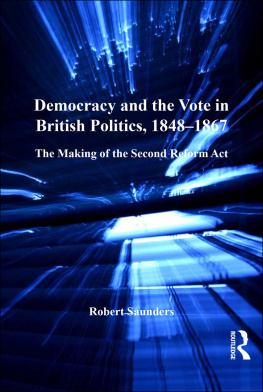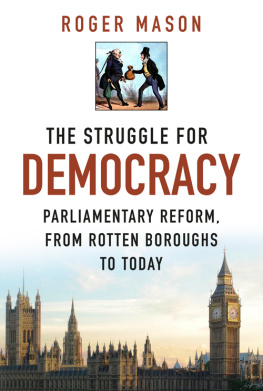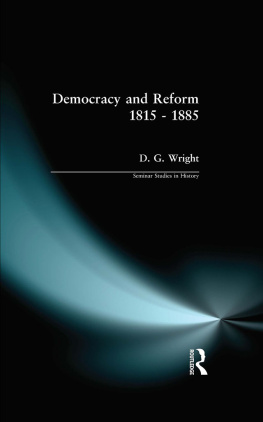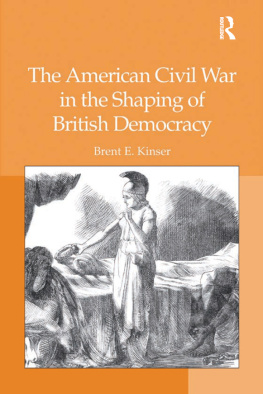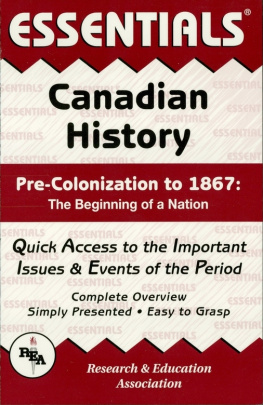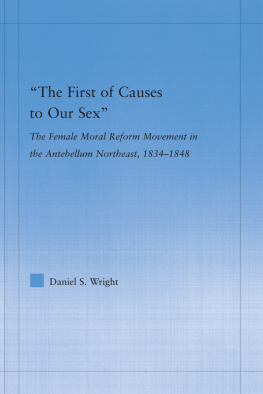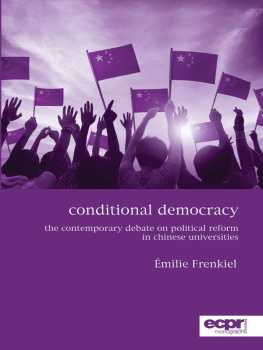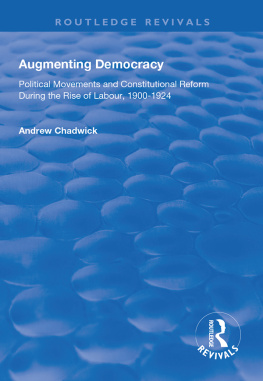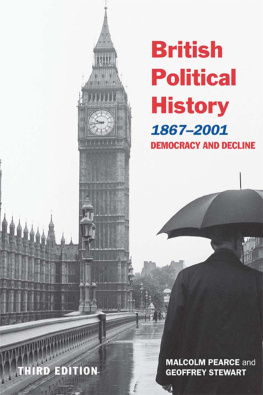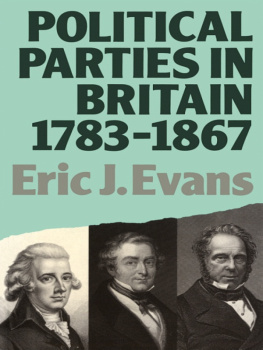DEMOCRACY AND THE VOTE IN BRITISH POLITICS, 18481867
For my parents, with love and thanks.
Democracy and the Vote in British Politics, 18481867
The Making of the Second Reform Act
ROBERT SAUNDERS
St Johns College, Oxford, UK
First published 2010 by Ashgate Publishing
Published 2016 by Routledge
2 Park Square, Milton Park, Abingdon, Oxon OX14 4RN
711 Third Avenue, New York, NY 10017, USA
Routledge is an imprint of the Taylor & Francis Group, an informa business
Copyright Robert Saunders 2011
Robert Saunders has asserted his right under the Copyright, Designs and Patents Act, 1988, to be identified as the author of this work.
All rights reserved. No part of this book may be reprinted or reproduced or utilised in any form or by any electronic, mechanical, or other means, now known or hereafter invented, including photocopying and recording, or in any information storage or retrieval system, without permission in writing from the publishers.
Notice:
Product or corporate names may be trademarks or registered trademarks, and are used only for identification and explanation without intent to infringe.
British Library Cataloguing in Publication Data
Saunders, Robert.
Democracy and the vote in British politics, 1848-1867 : the
making of the Second Reform Act.
1. Great Britain. Parliament--Reform--History--19th century. 2. Representative government and representation--Great Britain--History--19th century. 3. Suffrage--Great Britain--History--19th century. 4. Great Britain--Politics and government--1837-1901.
I. Title
328.410704-dc22
Library of Congress Cataloging-in-Publication Data
Saunders, Robert.
Democracy and the vote in British politics, 1848-1867 : the making of the second Reform Act / Robert Saunders.
p. cm.
Includes bibliographical references and index.
ISBN 978-1-4094-1794-1 (hardcover) -- ISBN 978-1-3155-7639-8 (ebook)
1. Election law--Great Britain--History. 2. Representative government and representation--Great Britain--History. 3. Great Britain. Reform Act (1867) 4. Suffrage--Great Britain--History. 5. Voting--Great Britain--History. 6. Great Britain. Parliament--Elections. 7. Democracy--Great Britain--History. 8. Great Britain--Politics and government--History. 9. Representative government and representation. I. Title.
KD4329.S28 2010
342.4105--dc22
2010032124
ISBN 9781409417941 (hbk)
ISBN 9781315576398 (ebk-PDF)
ISBN 9781317153153 (ebk-ePUB)
Contents
Acknowledgements
Like the British banking industry, I have run up more debts in recent years than I can possibly repay. The existence of this book, and the pleasure I have had in writing it, is due solely to the many friends and colleagues who have contributed along the way. I am especially thankful for the following:
The Fiscal Constitution. I am grateful to the AHRC for funding my doctoral research and to the Carlyle Trustees for a generous scholarship. Magdalen College, Oxford, assisted with travel expenses, while Lincoln College provided a term of research leave. I am also deeply grateful to my parents for supporting my studies over so many years.
The Lights of Liberalism. I have been privileged to receive friendship and instruction from many outstanding historians. Ben Jackson, Gregg McClymont, Ross McKibbin, George Southcombe, Philip Waller, William Whyte and Brian Young have been endlessly supportive, and their friendship has been a constant source of pleasure. I owe a particular debt to Peter Ghosh, who supervised my doctoral research. Always stimulating and endlessly entertaining, he has been a wonderful supervisor and a generous friend. I would also like to pay tribute to the late Ewen Green, who first taught me modern history. Ewen was a much loved and inspirational figure, and I learned far more from him than I realized at the time. He, with Peter, is the source of most of what is good in this book.
My sincere thanks go also to Emily Yates, Caroline Spender and to everyone involved in the production of this book at Ashgate. I am particularly grateful to the three anonymous referees who read and commented upon the manuscript. Their time and advice is greatly appreciated.
My Right Hon. Friends. This section alone could fill a library. I would like to express my warm thanks to Richard Smith and Louise Vincent, Joel and Ana Betancourt-Reeves and James Quartermaine, whose friendship, generosity and humour made research in London a pleasure. Stephen Payne has endured me as a housemate for far longer than I deserve, bearing with commendable stoicism the piles of mess and marmite with which I have cluttered his otherwise pristine home. He will be pleased to learn that lodgers did not always possess the franchise. My thanks and affection go to everyone at Lincoln College, Oxford, and particularly to my friends Sara Hobolt and Brian McElwee. Leonardo Martinez and Jacinta OShea have been wonderful friends throughout the writing of this book. Patrick Porter, as he once explained to me, has a mind like a Cathedral Organ, and vocal chords to match. He has contributed more than he realizes to this book and to the enjoyment of writing it.
Above all, I would like to thank my family: my siblings Patrick, Timothy and Sara and, in particular, my parents, Andrew and Penny Saunders. I am more grateful than I can say for their love and support, and this book is dedicated to them.
List of Abbreviations
BL | British Library |
BP | Bright Papers |
CP | Carnarvon Papers |
DH | Dep. Hughenden (Disraeli Papers) |
DP | Derby Papers |
EHR | English Historical Review |
GGP | George Grey Papers |
GP | Gladstone Papers |
HJ | Historical Journal |
LP | Lansdowne Papers |
NRA | National Reform Association |
PP | Palmerston Papers |
RP | Russell Papers |
TSSA | Transactions of the Social Science Association |
Introduction:
Democracy and the Vote in British Politics
On 15 August 1867, Britain experienced a quiet revolution. As so often in British history, the scene was not a battlefield or a popular assembly but the Chamber of the House of Lords, where the Royal Commissioners had gathered to give the Assent to new legislation. The Queen herself was on holiday in the Isle of Wight, the Prime Minister, Lord Derby, was also absent, and the front Opposition and Treasury benches were entirely unoccupied. As journalists drummed their fingers in the gallery, the Commissioners gave their approval to the Naval Knights of Windsor Bill, the Railways (Ireland) Bill and a series of minor statutes that have rarely troubled the historian. According to The Times, The proceeding was of the most formal and routine kind, and the whole transaction scarcely occupied five minutes.

